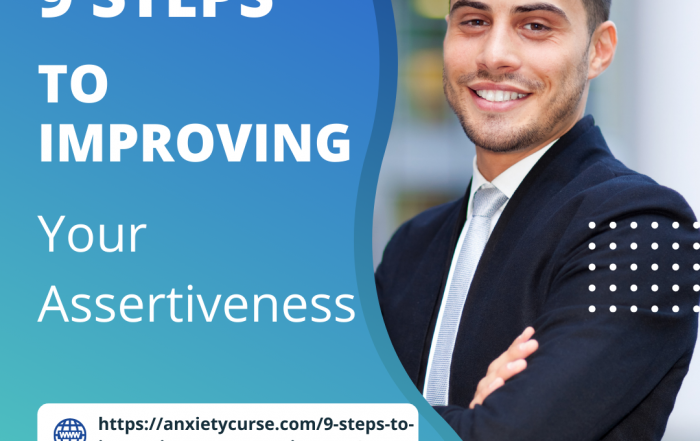It’s normal to feel nervous in some social situations. For example, going on a date or giving a presentation may cause that feeling of butterflies in your stomach.
But in social anxiety disorder, also called social phobia, everyday interactions cause significant anxiety, self-consciousness and embarrassment because you fear being scrutinized or judged negatively by others.
In social anxiety disorder, fear and anxiety lead to avoidance that can disrupt your life. Severe stress can affect your relationships, daily routines, work, school or other activities.
Social anxiety disorder can be a chronic mental health condition but learning coping skills in psychotherapy can help you gain confidence and improve your ability to interact with others.
Understanding Social Anxiety- FREE Workshop:
How does Social Anxiety impact our professional life?
Here are some of the most common symptoms of Social Anxiety at work:
You fear talking to your colleagues and/or people of power (manager, CEO); this condition is called ‘Power Syndrome’.
You agree to do things you’re not supposed to do, so that everyone likes you.
You’re normally unable to say ‘no’ to things or to delegate tasks– you feel you should take on other people’s work responsibilities.
You shun social events at work, or even if you do attend, you’re quiet and only talk to ‘safe’ people (people that you know).
You constantly worry about what other people think of you. Your thinking is so centred on what you look like to other people, you’re subconsciously looking for ‘confirmation’ that your negative thoughts are true.
You avoid or escape situations where you’re put on ‘spot’ (delivering presentations).
If someone asks about you, you give very brief answer and quickly turn the attention onto the other person, because you genuinely believe you’re boring and have nothing to offer.
You don’t ask for a promotion/ pay rise, because your self-esteem and self-belief is so low (‘I’m way too incompetent to deserve more’).
Learn How To Be Assertive At Work- FREE Workshop:
When we struggle with Social Anxiety, our focus is entirely on our heads (constant worries about how we appear/ what everyone thinks), and on the environment (looking for a confirmation how incapable/ incompetent we are).
This leaves us exhausted and pushes our self-esteem even lower.
What can you do right now to break Social Anxiety cycle?
Let’s start with something simple: FOCUS AWARENESS.
Let’s say you are facing a talk with your colleague/ manager and you’re feeling uncomfortable about it.
Here, we will work with what you’re already good at: listening.
As Social Anxieters, we don’t think much of ourselves, therefore we tend to ‘turn the spotlight onto the other person’ which, of course, makes that person feel good. Most people love being in the spotlight.
Try truly focusing on what the other person is saying. Guide the focus (gently) away from your thinking processes.
This is called ‘focus awareness’.
*You can download my free guide on Focus Awareness here (this is a very simple version- we do far deeper focus in sessions) + Anxiety breathing techniques + Negative Labelling Impact here:
Share This Article With Friends & Family
Even if your mind wanders back to your thoughts, gently bring the focus back onto the conversation.
Don’t suppress your thoughts; always acknowledge that they’re there, but right now you’re focusing on something else.
Social Anxiety is a debilitating condition and can seriously hinder your work progress. I have clients who are genuinely struggling in corporate environment and come to me to explore other work options.
BUT Social Anxiety can be successfully controlled and managed.
In my *Overcome Social Anxiety Program*, we work together over a period of 3 months, learning powerful social skills (psychological, practical and physical) to break Social Anxiety cycle and increase self-esteem and self-confidence.
We remove the fear associated with social situations and replace it with healthier alternatives.
Don’t struggle at work, and don’t wait until you can’t cope anymore and are signed off work.
Request a complimentary consultation today:
Say Goodbye to Worry: A Simple Technique You Can Master Today
Do you ever find your mind clouded with worry? Whether it's about your job, relationships, or the future, worry can feel all-consuming. If you can relate, you're not alone. But what if there was
The Art Of *Silence* When We Struggle With Social Anxiety
Oh, the Social Anxiety. It makes us QUIET when we'd love to say something, because we have all these negative thoughts about our communications skills, including: 1. I have nothing interesting to say. 2.
Anxiety And Procrastination At Work
Can Anxiety cause Procrastination? Absolutely. Anxiety and Low Mood can both result in Procrastination at work. In this article, I'm going to take a closer look at what Procrastination is, and how to help yourself if you
Social Anxiety At Work
In this article, we are going to be looking at some of the most common symptoms of Social Anxiety at work. We’ll also look at the impact of untreated Social Anxiety on your career
Assertiveness Mastery: 9 Effective Steps to Improve Assertiveness Skills and Boost Self-Confidence
In today's fast-paced world, mastering assertiveness skills has become an essential tool for personal and professional growth. It's not just about being confident; it's about communicating your needs and respecting others in a balanced
How To Get A Grip On Procrastination
Today, I was inspired to write about procrastination by a long-term, young client of mine. We've been working together for the past 2 years (on and off), as he struggles with Social Anxiety




